The Economics and Statistics Division maintains archives of previous publications for accountability purposes, but makes no updates to keep these documents current with the latest data revisions from Statistics Canada. As a result, information in older documents may not be accurate. Please exercise caution when referring to older documents. For the latest information and historical data, please contact the individual listed to the right.
<--- Return to Archive
For additional information relating to this article, please contact:
September 24, 2020DEATH COUNTS AND EXCESS MORTALITY, JANUARY-JULY 2020 The first death attributed to COVID-19 in Canada was reported in British Columbia occurring on March 8, 2020. COVID-19 has caused the death of more than 9,200 people in Canada.
Statistics Canada has provided provisional information on deaths in Canada during the first 31 weeks of 2020 (up to August 1). The data does not include all deaths that occurred during the reference period; note, Ontario and New Brunswick information is not fully complete for recent weeks. This includes deaths attributable to all causes; fluctuations from one week to the next may be attributable to many different causes of death.
A comparison of deaths in 2020 with the number of deaths reported in similar weeks in previous years allows estimation of 'excess' deaths above what is usually reported. The number of deaths reported in each week is represented below as a ratio of deaths per 1 million residents (population as of January 1 of the year).
Across Canada, there was a period of excess mortality in April and early May. This was concentrated in Quebec, Ontario, Alberta and British Columbia. There were also elevated deaths in Nova Scotia in the week ending April 25; Statistics Canada notes that deaths due to COVID-19 were reported in that week, but the total was affected by lives lost in the mass shooting on April 18-19.
Since May, the levels of deaths in all provinces has fallen. Deaths per 1 million residents remain above recent years for British Columbia and Alberta and consistent with recent years in Manitoba and Prince Edward Island. Deaths per 1 million residents are below recent years for Newfoundland and Labrador, Nova Scotia, New Brunswick, Quebec, Ontario and Saskatchewan.

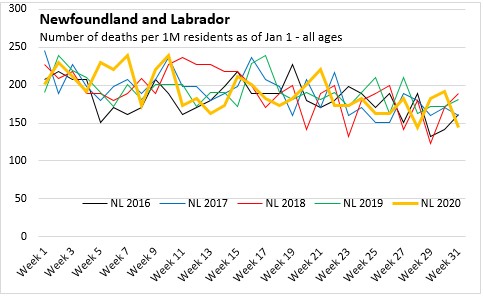

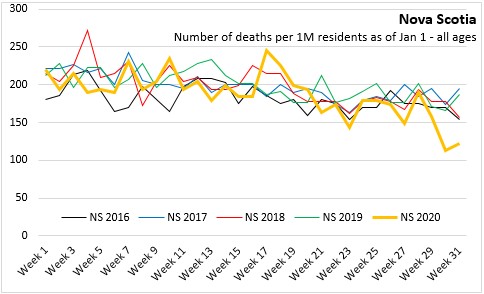


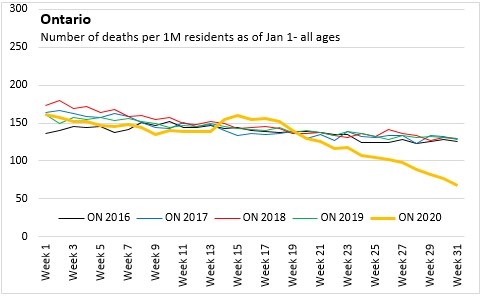
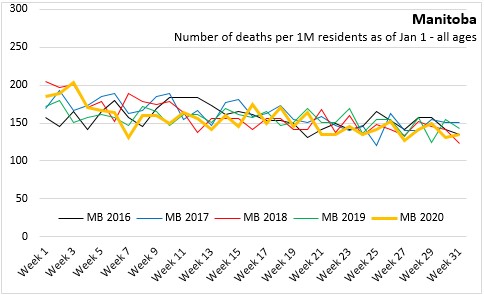
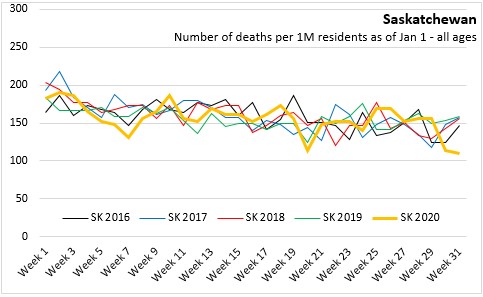
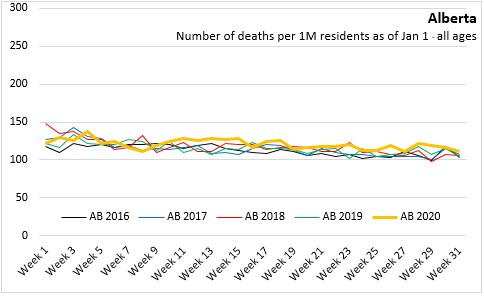
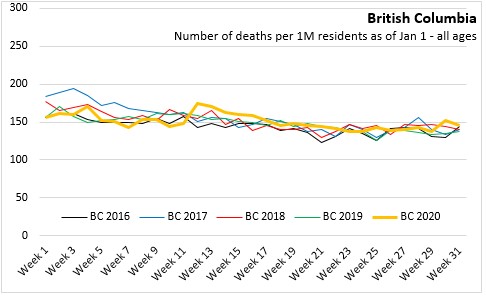
Based on observed historical trends, Statistics Canada has estimated the expected number of deaths for each week in 2020 and compared this with observed deaths (adjusted where possible reflecting provisional data). Estimates of expected deaths are presented with a 95 per cent confidence interval. Data for New Brunswick and Ontario are lagged and not available in the most recent weeks.
This analysis shows that Quebec experienced greater excess mortality than other provinces, well above the upper bound of confidence intervals for expected deaths in April and May. Deaths were also elevated above expected values in Alberta and British Columbia, but not outside of confidence intervals for extended periods. There were individual weeks with excess mortality at or above the upper bound of the confidence interval for expected deaths in Newfoundland and Labrador, Nova Scotia, New Brunswick, Manitoba and Saskatchewan.
Nova Scotia has reported significantly fewer than expected deaths for the last 2 weeks of data, falling below the lower bound of the confidence interval for expected deaths. Recent deaths are also slightly below the predicted lower bound for expected deaths in Quebec and Saskatchewan.
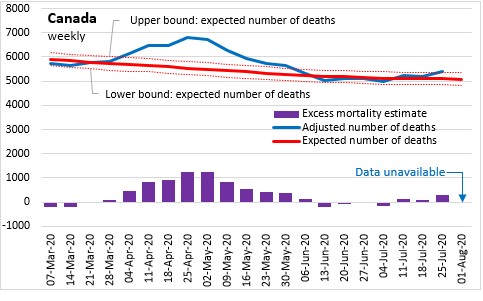
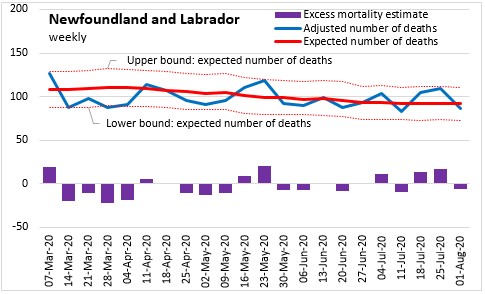

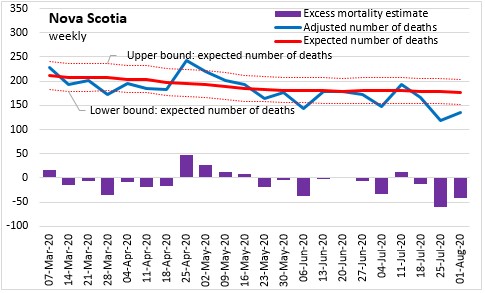
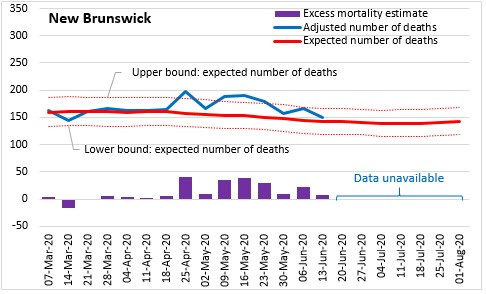
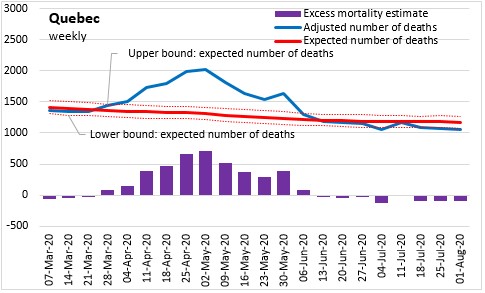
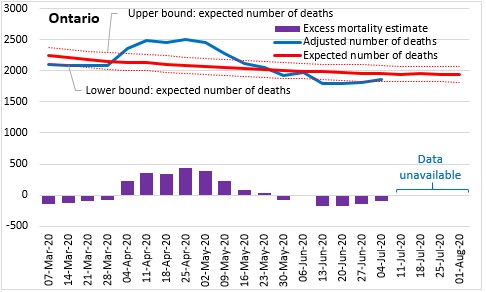

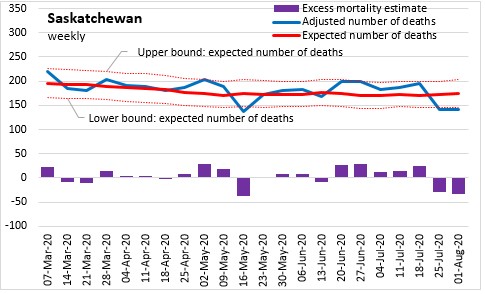
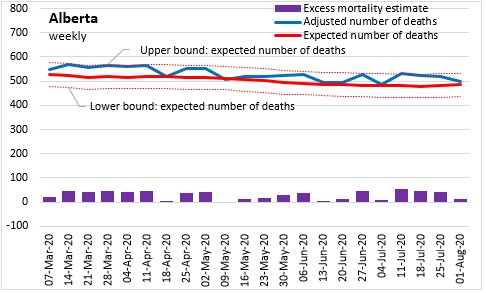
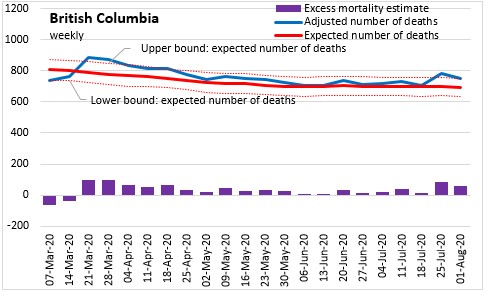
Source: Statistics Canada. Table 13-10-0768-01 Weekly death counts, by age group and sex; Table 13-10-0784-01 Adjusted number of deaths, expected number of deaths and estimates of excess mortality, by week
<--- Return to Archive